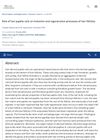TLDR Apigenin may help promote hair growth and could treat hair loss.
In the 2009 study, researchers developed a cell-based assay to evaluate the effects of substances on TGF-ß1 promoter activity, which is linked to hair growth suppression in androgenetic alopecia. They found that dihydrotestosterone (DHT) increased TGF-ß1 promoter activity, while curcumin decreased it. The study highlighted that apigenin, a compound known for its antioxidant and anti-inflammatory properties, reduced TGF-ß1 expression and stimulated the proliferation of human dermal papilla cells and keratinocytes, as well as hair follicle elongation in rat vibrissa hair follicle cultures. Apigenin at concentrations of 1 and 5 µM significantly increased cell proliferation and hair shaft growth, with 5 µM being more effective than 10 µM. These findings suggest that apigenin has the potential to promote hair growth and could be a therapeutic option for treating androgenetic alopecia. The study did not specify the number of samples or participants involved.
 13 citations
,
June 2007 in “Journal of Dermatological Science”
13 citations
,
June 2007 in “Journal of Dermatological Science” Researchers created a cell line to study hair growth and found specific genes affected by dihydrotestosterone.
 78 citations
,
June 2003 in “Journal of Investigative Dermatology Symposium Proceedings”
78 citations
,
June 2003 in “Journal of Investigative Dermatology Symposium Proceedings” TGF-β1 from dermal papilla cells suppresses hair growth, and targeting it may help treat androgenetic alopecia.
 190 citations
,
October 2002 in “The FASEB journal”
190 citations
,
October 2002 in “The FASEB journal” Androgens may cause hair loss by increasing TGF-beta1 from scalp cells, which inhibits hair cell growth.
 1113 citations
,
August 1999 in “The New England Journal of Medicine”
1113 citations
,
August 1999 in “The New England Journal of Medicine” Hair follicle biology advancements may lead to better hair growth disorder treatments.
148 citations
,
October 1997 in “Journal of Investigative Dermatology” 38 citations
,
March 1997 in “Journal of interferon & cytokine research” IL-1β inhibits human hair follicle growth.
133 citations
,
July 1994 in “Journal of Dermatological Science” Human hair growth can be influenced by certain growth factors and has specific metabolic needs.
 321 citations
,
December 2009 in “Journal of Dermatological Science”
321 citations
,
December 2009 in “Journal of Dermatological Science” Dermal cells are key in controlling hair growth and could potentially be used in hair loss treatments, but more research is needed to improve hair regeneration methods.
January 2003 in “Chinese Journal of Reparative and Reconstructive Surgery” Dermal papilla cells can help form hair follicles and produce hair.
 66 citations
,
August 2001 in “Experimental Dermatology”
66 citations
,
August 2001 in “Experimental Dermatology” Human hair follicle cells can grow hair when put into mouse skin if they stay in contact with mouse cells.
 57 citations
,
November 1998 in “Wound Repair and Regeneration”
57 citations
,
November 1998 in “Wound Repair and Regeneration” Hair papilla cells can create and regenerate hair bulbs under the right conditions.







